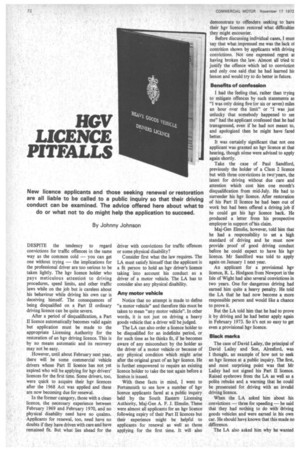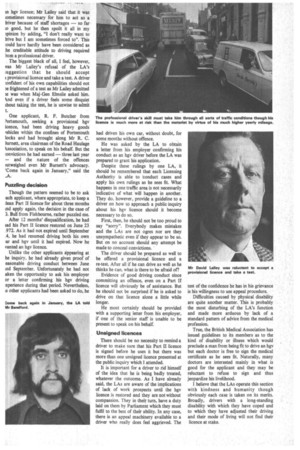HGV LICENCE PITFALLS
Page 78

Page 79

If you've noticed an error in this article please click here to report it so we can fix it.
New licence applicants and those seeking renewal or restoration are all liable to be called to a public inquiry so that their driving conduct can be examined. The advice offered here about what to do or what not to do might help the application to succeed.
By Johnny Johnson DESPITE the tendency to regard convictions for traffic offences in the same way as the common cold -you can get one without trying — the implications for the professional driver are too serious to be taken lightly. The hgv licence holder who pays meticulous attention to driving procedures, speed limits, and other traffic laws while on the job but is careless about his behaviour while driving his own car is deceiving himself. The consequences of being disqualified on a Part II ordinary driving licence can be quite severe.
After a period of disqualification, a Part II licence automatically becomes valid again but application must be made to the appropriate Licensing Authority for the restoration of an hgv driving licence. This is by no means automatic and its recovery may not be easy.
However, until about February next year, there will be some commercial vehicle drivers whose Part II licence has not yet expired who will be applying for hgv drivers' licences for the first time. Some drivers, too, were quick to acquire their hgv licences after the 1968 Act was applied and these are now becoming due for renewal.
• In the former category, those with a clean licence, the necessary experience between February 1969 and February 1970, and no physical disability need have no qualms. Applicants for renewal, too, need have no doubts if they have driven with care and have remained fit. But what lies ahead for the driver with convictions for traffic offences or some physical disability?
Consider first what the law requires. The LA must satisfy himself that the applicant is a fit person to hold an hgv driver's licence taking into account his conduct as a driver of a motor vehicle. The LA has to consider also any physical disability.
Any motor vehicle Notice that no attempt is made to define "a motor vehicle" and therefore this must be taken to mean "any motor vehicle". In other words, it is not just on driving a heavy goods vehicle that a driver will be judged.
The LA can also order a licence holder to be disqualified for an indefinite period, or for such time as he thinks fit, if he becomes aware of any misconduct by the holder as the driver of a motor vehicle or because of any physical condition which might arise after the original grant or an hgv licence. He is further empowered to require an existing licence holder to take the test again before a licence is issued.
With these facts in mind, I went to Portsmouth to see how a number of hgv licence applicants fared at a public inquiry held by the South Eastern Licensing Authority, Maj-Gen A. F. J. Elmslie. These were almost all applicants for an hgv licence following expiry of their Part II licences but their experience might be helpful to applicants for renewal as well as those applying for the first time. It will also
demonstrate to offenders seeking to haw their hgv licences restored what difficultiv they might encounter.
Before discussing individual cases, I musl say that what impressed me was the lack of contrition shown by applicants with driving convictions. Not one expressed regret al having broken the law. Almost all tried ta justify the offence which led to convictiot and only one said that he had learned ha lesson and would try to do better in future.
Benefits of confession had the feeling that, rather than trying to mitigate offences by such statements as "I was only doing five (or six or seven) miles an hour over the limit" or "I was just unlucky that somebody happened to see me" had the applicant confessed that he had transgressed, even if he had not meant to and apologized then he might have fared better.
It was certainly significant that not one applicant was granted an hgv licence at that hearing, though some were advised to apply again shortly.
Take the case of Paul Sandford, previously the holder of a Class 2 licence but with three convictions in two-years, the latest for driving without due care and attention which cost him one month's disqualification from mid-July. He had to surrender his hgv licence. After restoration of his Part 11 licence he had been out of work but had been offered a driving job if he could get his hgv licence back.. He produced a letter from his prospective employer in support of-his claim.
Maj-Gen Elmslie, however, told him that he had a responsibility to set a high standard of driving and he must now provide proof of good driving conduct before he could expect to have his hgv licence. Mr Sandford was told to apply again on January 1 next year.
An applicant for a provisional hgv licence, R. L. Hodgson from Newport in-the Isle of Wight had also several convictions in two years. One for dangerous driving had earned him quite a heavy penalty. He told the LA that he had now become a more responsible person and would like a chance to prove it.
But the LA told him that he had to prove it by driving and he had better apply again in February 1973. So it's not so easy to get even a provisional hgv licence.
Black marks The case of David Lailey, the principal of David Lailey and Son, ALresford, was I thought, an example of how not to seek an hgv licence at a public inquiry. The first, and most surprising point was that Mr Lailey had not signed his Part H licence. Raised eyebrows from the LA as well as a polite rebuke and a warning that he could be prosecuted for driving with an invalid driving licence.
When the LA asked him about his convictions — three for speeding — he said that they had nothing to do with driving goods vehicles and were earned in his own car. He should have known that this made no difference.
The LA also asked him why he wanted
in hgv licence; Mr Lailey said that it was ;ometimes necessary for him to act as a iriver because of staff shortages — so far io good, but he then spoilt it all in my )pinion by adding, "I don't really want to irive but I am sometimes forced to". This :ould have hardly have been considered as he creditable attitude to driving required rom a professional driver.
The biggest black of all, I feel, however, vas Mr Lailey's refusal of the LA's ;uggestion that he should accept t provisional licence and take a test. A driver :onfident of his own capabilities should not )e frightened of a test as Mr Lailey admitted le was when Maj-Gen Elmslie asked him. knd even if a driver feels some disquiet 'bout taking the test, he is unwise to admit t.
One applicant, R.. F. Butcher from lortsmouth, seeking a provisional hgv icence, had been driving heavy goods vehicles within the confines of Portsmouth locks and had brought along Mr R. C. 3urnett, area chairman of the Road Haulage kssociation, to speak on his behalf. But the :onvictions he had earned — three last year — and the nature of the offences )utweighed even Mr Bumett's advocacy. 'Come back again in January," said the A.
Puzzling decision Though the pattern seemed to be to ask :ach applicant, where appropriate, to keep a lean Part II licence for about three months md apply again, the decision in the case of 1 Bull from Fishbourne, rather puzzled me. After 12 months' disqualification, he had tad his Part II licence restored on June 23 .972. As it had not expired until September 4, he had resumed driving both his own :ar and hgv until it had expired. Now he ranted an hgv licence.
Unlike the other applicants appearing at he inquiry, he had already given proof of easonable driving conduct between June Ind September. Unfortunately he had not aken the opportunity to ask his employer or a letter confirming his hgv driving xperience during that period. Nevertheless, ts other applicants had been asked to do, he had driven his own car, without doubt, for some months without offence.
He was asked by the LA to obtain a letter from his employer confirming his conduct as an hgv driver before the LA was prepared to grant his application.
Despite these rulings by one LA, it should be remembered that each Licensing Authority is able to Conduct cases and apply his own rulings as he sees fit. What happens in one traffic area is not necessarily indicative of what will happen in another. They do, however, provide a guideline to a driver on how to approach a public inquiry about his hgv licence should it become necessary to do so.
First, then, he should not be too proud to say "sorry". Everybody makes mistakes and the LAs are not ogres nor are they. unsympathetic even if they appear to be so. But on no account should any attempt be made to conceal convictions.
The driver should be prepared as well to be offered a provisional licence and a re-test. After all if he can drive as well as he thinks he can, what is there to be afraid of?
Evidence of good driving conduct since committing an offence, even on a Part It licence will obviously be of assistance. But he should not be surprised if he is asked to drive on that licence alone a little while longer.
He most certainly should be provided with a supporting letter from his employer, if one of the senior staff is unable to be present to speak on his behalf.
Unsigned licences There should be no necessity to remind a driver to make sure that his Part II licence is signed before he uses it but there was more than one unsigned licence presented at the public inquiry which I attended.
It is important for a driver to rid himself of the idea that he is being badly treated, whatever the outcome. As I have already said, the LAs are aware of the implications of lack of work prospects until the hgv licence is restored and they are not without compassion. They in their turn, have a duty laid on them by Parliament which they must fulfil to the best of their ability. In any case, there is an appeal machinery available to a driver who really does feel aggrieved. The
test of the confidence he has in his grievance is his willingness to use appeal procedure.
Difficulties caused by physical disability are quite another matter. This is probably the most disturbing of the LA's function and made more arduous by lack of a standard pattern of advice from the medical profession.
True, the British Medical Association has issued guidelines to its members as to the kind of disability or illness which would preclude a man from being fit to drive an hgv but each doctor is free to sign the medical certificate as he sees fit. Naturally, many doctors are interested mainly in what is good for the applicant and they may be reluctant to refuse to sign and thus jeopardize his livelihood.
I believe that the LAs operate this section with kindness and humanity though obviously each case is taken on its merits. Broadly, drivers with a long-standing disability with which they have coped and to which they have adjusted their driving and their mode of living will not find their licence at stake.
































































































































































